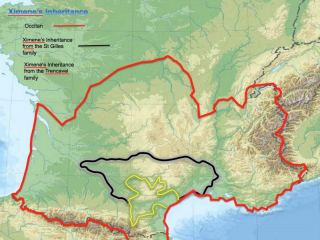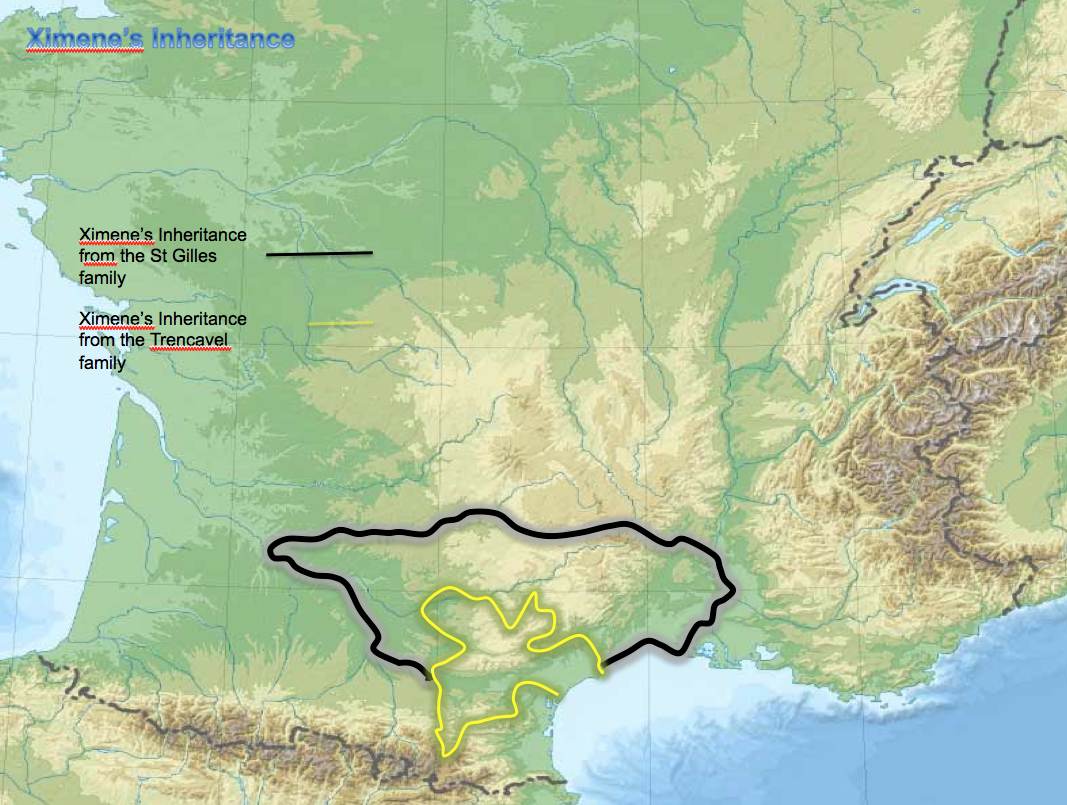The Cathar faith is fundamentally different than the Christianity taught by the Church. Cathars believe that “God the father” of the Roman church is Set the Egyptian God of chaos,”The Demierge” or the Devil. The physical world is the Devil’s realm and this world is hell. Both the Old Testament and the New Testament of the Church of Rome are therefore inspired by the Devil and should be rejected. The Church of Rome betrays itself by its obsession with the material world; wealth, property, elaborate churches, extravagent lifestyles,bejewelled vestments and elaborate ceremonials.
The Church of Rome naturally sees all these beliefs as a dangerous attack on its establishment and a threat to its continuance as the leading European Religion. hence the Crusade, hence the Inquisition.
Ximene is faced with a personal crisis. She has been brought up to believe that her destiny is to reclaim her inheritance and create a haven for members of the Cathar religion who were also dispossessed and persecuted during the crusade. Ximene wrestles with her conscience. The material world is a living hell and all humans are trying to escape from it. Escape can only be achieved if there is total rejection of material possessions. She fears that to fulfil her destiny she will inevitably place herself in conflict with this teaching.
She believes in the Good God , the Godhead, Isis, the Egyptian enemy of Set, if a personalisation is required. Mankind should all be part of a single nation, irrespective of cultural or racial differences. Until recently the concept of one unified state has always seemed achievable but now, rulers are establishing the concept of nationhood. Ximene believes that if Occitan is to be reclaimed it will have to become a nation itself. It will not be enough for Ximene to become a Comptress, she will have to make herself a Queen. This will involve close involvement with the material world, possession and utilisation of wealth,lands and property. Ximene’s problem is that the actions she is contemplating are, almost by definition, a direct contravention of the Cathar Faith .
In the context of the developing concepts of nationhood Ximene has little doubt that Occitan has the right to be considered a Nation.
“What makes a state? Speaking the same language; having the same culture, worshipping the same god, living in an area clearly delineated by natural features, being prepared to group together for mutual defense? By all these criteria there is a state of Occitan.”
However other parts of Occitan are under the control of the Plantagent family, rulers of England and of Aragon. Ximene believes that an alliance with either one of them could be of advantage.
Occitan is admired by some but attacked by the Church of Rome not just because of its adherance to the Cathar faith but also because of its unique culture. Both formally and informally, it is a world controlled by the rules of the Courts of Love. These courts are a woman’s world, into which a man may enter, but only if he accepts the rules. The link between the Courts of Love and the Cathar faith are tenuous but the effect is to give women complete control of every sexual encounter, something the Cathar faith itself demands.
Ximene knows that any attempts she makes reclaim her inheritance will be resisted by the Church of Rome because of her commitment to re-establishing the Cathar Faith.In her blackest moments she sees herself being captured and executed just as Jesus was. She occasionally wonders, Good God forbid, if she is the second coming. She is aware she may face outright aggression.
Should warfare occur, is also governed governed by a strict set of rules, the rules of chivalry. In its rules for the treatment of women chivalry are a good match for the Courts of Love. However the rules of chivalry have been promoted and encouraged by the Roman Church. Ximene wonders how chivalry would cope with a Female Warlord, particularly an Heretical Female Warlord!
In any case there are those who would oppose her just because she is a woman. Ximene discovers that even in Occitan itself there are men who resent the very suggestion of a woman’s interference in Affairs of State.
Overlaid above these considerations is a belief that a chosen few carry the Sangreal, said to be the Holy Blood, obtained by descent from Jesus or his predecessors. Those who carry it are considered to have “The right to rule”. The Roman Church has itself encouraged this belief to justify it’s selection of the leader of the Franks, Clovis, a minor germanic tribe as the successor to the Roman Emperors. Ximene carries this blood herself but not in it’s purest form. The possession of the Sangreal in itself brings danger as well as opportunity. Those who want to incorporate the Sangreal in their own bloodlines are prepared to hunt down an kill those who refuse their offer of marriage. To claim the presence of Sangreal in Cathar families is guaranteed to rase the ire of the Roman Church.
When Ximene dreams, she dreams of threats and challenges but also of the joyful fulfilment of her most basic desires. In most of the dreams she experiencesa the challenge of fullfilling her destiny but in a world in which her safety and pleasure are effortlessly achieved. She has the same underlying needs as anyone one else. Her dreams sometimes reflect those needs need in a very dramatic way.but it is land which was ripped away from her family during the Albigensian crusade. It is not likely that those who were given the land at conclusion of the crusade will return it to Ximene without a fight.
In April 1355 Ximene Trencavel is seventeen years of age . She dreams of a life full of romance and adventure but in real life faces persecution and danger.
The objective of the Crusade was declared to be the elimination of the Cathar faith, an alternative version of christianity judged to be heretical by the Church of Rome.
 Greater OccitanXimene was the rightful heir to vast tracts of land, land which had been ripped away from her family during the Albigensian crusade. It was not likely that the land would be returned to Ximene without conflict.
Greater OccitanXimene was the rightful heir to vast tracts of land, land which had been ripped away from her family during the Albigensian crusade. It was not likely that the land would be returned to Ximene without conflict.
Ximene’s claim is bounded approximately by four rivers; la Garonne, La Lot, L’Arriage and the La Rhone. The other boundary is the north western shore of the Golfe Du Lion at the north western edge of the Mediterannean.
Her claim did not encompass the whole of Occitan but only the Compte de Toulouse including the Vicomptes of Albi, Carcasonne,Razes and Beziers. There is a much larger area in which the native tongue is Langue d’Oc., bounded by even better natural boundaries
A large part of Occitan was controlled by Aragon. In 1160 the Trencavels switched their alligence away from the Compte de Toulose (and therefore ultimately away from the Franks), to Aragon.The honest broker who arrange this change was none other than Richard the Lionhart!
The reason for Richard’s involvement is that his mother’s family,the Ramnulfids, Dukes of Aquitaine had control of an even bigger part of Occitan and also had a claim over the Compte de Toulouse. In fact the reason the Comptes de Toulouse decided to swear allegience to the King of the Franks was escape the control imposed by the Ramnulfids. The Comptes de Toulouse wanted independance. By swearing allegiance to the Francs, whose power base was far away in the North they had far more freedom than if they swore allegiance to the Ramnulfids, near neighbors along the Garonne valley.
The St Gilles Family were Comptes of Toulouse. Towards the end of the Albigensian crusade the male line failed and the daughter of the last St Gilles was forced to marry Alphonse Son of the Frankish King Louis VIII. They had no children. This meant that the St Gilles Lands, but not necessarily the title of Count of Toulouse Reverted to the Trencavels and ultimately to Ximene.
The Trencavel Family (English “The Nutcrackers”) were Viscomptes of Beziers, Carcassonne, Albi and Razes. As an example of the complexity of the real situation, although the Trencavels had sworn allegiance to Aragon for their Southern lands,Carcassonne and Razes French records show that just before the Crusade, the Trencavels still owed allegiance to the Comptes of Toulouse for the Viscompte of Albi.
In the period 1230-1260, Roger I de Beziers, a Trencavel under another name, made a spirited campaign to regain his lands. This last desperate attempt was supported by money from Frederich II, Holy Roman Empower. Frederich grew up in the back streets of Sicily, mixed with Cathar refugees and hated the Pope and his Church with a passion. Yes, that is right, he was the Holy Roman Emperor! He managed to get himself excommunicated for leading a successful crusade. It won the anger of the Pope because he negotiated with the Saracens and instead of killing them!
The family trees show that, it was through the line of Maria Fernandez De Henestrosa that the Sangreal was introduced to Ximene’s family, with far reaching implications.
